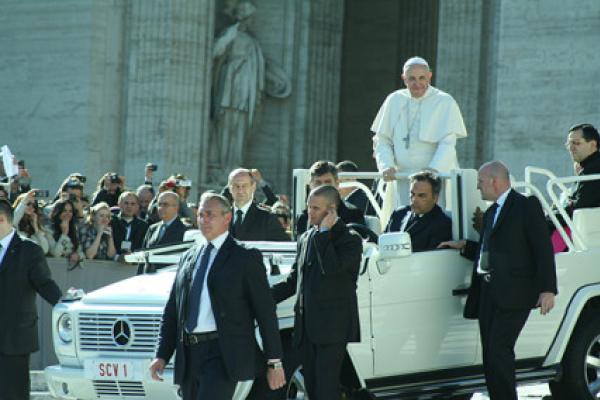So what’s it like to come to work every day when your boss is the pope?
Much also depends on whether you are one of the approximately 3,500 (mostly Italian) lay people in the Vatican’s workforce or one of the 1,100 or so cardinals, bishops, priests, or religious brothers and sisters who tend to occupy decision-making positions and are deeply invested in the policies that Francis adopts.
That second group, often defined by their ideologies and rivalries, tends to draw the most attention, given the high stakes and fierce passions involved.
“I have even heard people say ‘We are praying for him [Francis] to die as soon as possible,’” Honduran Cardinal Oscar Rodriguez Maradiaga, head of Francis’ hand-picked advisory group of eight cardinals, told a German Catholic news agency recently.
“That is wicked — but such people think they are Christians.”
No wonder the pope has spent so much of his first year in office warning cardinals and bureaucrats against indulging in the kind of court intrigues, gossip, and favoritism that helped push his predecessor, Benedict XVI, to resign.
In his Ash Wednesday homily, in fact, Francis at one point looked up from his text on penance and stared at the Vatican churchmen arrayed around him. “When I watch, in this little everyday environment, various power struggles for position, I think to myself: These people are trying to play God, the Creator,” the pope said . “They still haven’t realized that they are not God.”
In any institution facing the kind of structural and cultural overhaul that Francis promises, there’s going to some agita. And such conflicts can be even sharper in organizations dedicated to a mission — be it political or religious. Still, there are some dynamics that are peculiar to the Holy See.
Entrenched bureaucracies
While a pope is the chief executive, legislator, and judge in the Catholic Church, in many ways he has less flexibility in shaping his administration than an incoming U.S. president who quickly replaces political appointees at every level.
Popes have to act more circumspectly and slowly, because they do not want to operate like a political boss and divide the church. What’s more, they need to keep the papal bureaucracy on their side. Otherwise a new pope, especially an outsider like Francis, can too easily be isolated and outmaneuvered.
Even his predecessor, Pope Benedict XVI, a longtime veteran of the Vatican machine, struggled with this dynamic. “My authority,” he reportedly told a visitor, near the end of his reign, “ends at that door.”
As a result, the papal administration features a mix of new appointees and old guard types. Not surprisingly, the new hires tend to support the changes, while veterans tend to be “anxious, resentful, even paranoid,” said a priest in the Curia who didn’t want his name used for fear of retribution.
The priest laughed because he said anyone who has come to Rome since Francis was elected — even if they are native Italians, like the new secretary of state, Cardinal Pietro Parolin — is called a “foreigner” by the old guard.
“Everybody who was in the loop is out of the loop,” he said.
‘La Gioconda’
Under Francis, some don’t even know where the loop is. When Francis was a Jesuit leader in Argentina and Cardinal Jorge Bergoglio of Buenos Aires, those who worked with him dubbed him “Mona Lisa” because of his enigmatic smile that seemed welcoming but revealed nothing. He can be much the same today, and some in Rome refer to His Holiness as “La Gioconda.”
The old guard, not surprisingly, has been the most unsettled, and some have let hints of their discontent slip out. Archbishop Georg Gaenswein, who is a close aide to Pope Benedict in retirement but also works with Francis, has lamented some of the new pope’s “innovations.” Cardinal Raymond Burke, an American who has occupied senior positions in Rome for years, has questioned the new pope’s plans and priorities.
Those who are now in the loop, like German Cardinal Walter Kasper, a favorite of Francis, are instead embracing change and pushing for more — suggesting that women take leadership roles in the Curia to help cure “the terrible vice” of clerical careerism. He also floated the idea of term limits for Vatican officials and said recently that the Curia simply has too many bishops.
But on a more mundane level, there is also concern among lay employees, most of whom see the Vatican as a job as much as a calling. The curial reforms, combined with the Vatican’s financial woes, have led to wage freezes and expectations of deep cuts in salaries and staffing levels. That’s a disturbing scenario for many, especially given the troubled Italian economy beyond the Vatican walls.
“It’s unsettling, yes. No one knows where they will be in a year,” said a senior Vatican official, a European cleric, who asked for anonymity in order to speak freely.
But he is also one of those “non-lifers” in the Curia who think that as long as lay employees are provided for, change is necessary, and healthy.
“Uncertainty can be good,” he said. “It forces people to think for themselves, and we could use that around here.”
David Gibson writes for Religion News Service. Via RNS.
Got something to say about what you're reading? We value your feedback!
